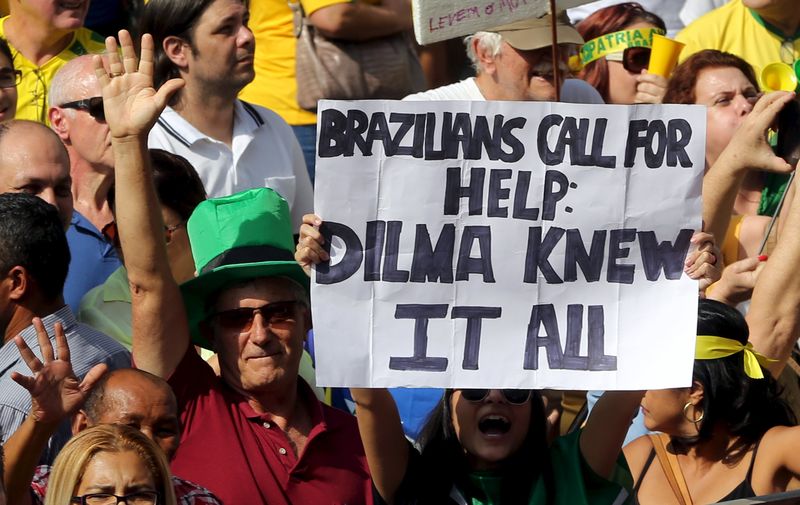By Brad Haynes
SAO PAULO (Reuters) - Brazilians took to the streets in over 100 cities on Sunday in the second major protest of the year against President Dilma Rousseff, blaming her for a sputtering economy and widening corruption scandal at state-run oil company Petrobras.
While the crowds shrank significantly from around a million protesters on March 15, organizers said the dozens of major demonstrations in every corner of Brazil showed the extent of anti-government sentiment that has taken hold in the country.
Three quarters of Brazilians support the protests, according to a Datafolha poll released on Saturday.
"Out with Dilma" was the recurring chant at the peaceful, almost festive protests, and that sentiment united the handful of loosely associated groups organizing the events. But views differed widely on what their rallying cry meant.
"The best would be for her to resign so the country doesn't have to suffer so much with impeachment," said Sandra di Giacomo, a protester in São Paulo draped in a Brazilian flag.
State police said she was one of 275,000 there, down from a million protesters in the city on March 15. Polling firm Datafolha estimated 100,000 demonstrators in São Paulo on Sunday, down from 210,000 a month ago.
"Impeachment Now" read a banner stretching most of a city block in Sao Paulo. Nearly two thirds of Brazilians favor impeachment of the president who narrowly won re-election in October, according to Datafolha, but almost as many doubt the corruption scandal will drive Rousseff from office.
Opposition parties have played down the prospects for impeachment, even as prosecutors charge members of Rousseff's ruling coalition in the graft investigation at state-run oil giant known formally as Petroleo Brasileiro SA.
Rousseff herself is not under investigation in the still-expanding Petrobras probe. She says she knew nothing about the bribery and price-fixing racket that allegedly cost the company billions of dollars while she was chairwoman from 2003 to 2010.
"Dilma is on thin ice. Her future depends on this case," said Cristia Lima, an activist with a group called Brazil Against Corruption, at the protest in the capital Brasilia.
"Nobody really expects impeachment to take place because much of the political class is implicated too, but popular pressure could force her to quit," Lima added.

If Rousseff were to leave office, the next in line would be Vice President Michel Temer of the centrist PMDB party, whose leaders have also been caught up in the Petrobras scandal along with Rousseff's own leftist Workers Party.